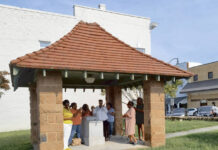WINGATE — Wingate University’s Department of Physical Therapy provided nearly $25,000 worth of free treatments to the community in six months this year, according to facts and figures reported about its new pro bono clinic.
The clinic, Wingate Rehabilitation and Performance (WRAP), provides services free of charge every Monday afternoon during the semester to referred patients, most of whom are uninsured or underinsured. First- and second-year students, under the supervision of Wingate professors, do assessments and take patients through their range of treatments. WRAP is the successor of a pair of clinics (neurowellness and pro bono offerings) that were put on hiatus during the pandemic.
Between launch in June and the end of the semester, the clinic recorded 215 patient visits that in a commercial setting would have cost a combined $24,425.40. Patients saved an estimated $4,885.08 (assuming a 20 percent co-insurance payment under Medicare), while insurance companies saved $19,540.32. In many cases, WRAP organizers say, patients would not have been able to afford the fees required to access the care.
“It’s meaningful to us to say, ‘You know, we’re giving these people that much care that they wouldn’t get otherwise,’” says Dr. Karen Friel, director of the DPT program. “We are very community- and service-oriented, and it’s become a trademark of our program.”
Friel says the total figures exceeded the expectations she and Dr. Tyler Shultz, director of clinical operations, had for the program. In addition to the number of patient visits recorded, Wingate students conducted 42 evaluations.
Friel says that the cancellation rate of 22.5% was particularly low for a free clinic. Over the last few weeks, the clinic had a waiting list. “That signifies that our patients saw value in the experience,” she says.
PT students also see value in the clinic. Under Wingate’s “lab of difference-making” ethos, the clinic provided hands-on experience for students at a very early stage of their instruction. Monday afternoons were cleared of any classroom work so that all students not on clinical rotations would be available, and the clinic was set up so that the curriculum matched up, in as many cases as possible, with patients’ needs.
For first-year student Taylor Elslager, that meant working with a patient with shoulder problems while taking a course on musculoskeletal (MSK) upper extremities.
“Being able to work with a shoulder patient while taking upper extremity MSK was an incredible opportunity,” she says. “I was able to take exactly what was being taught in the classroom and
apply it with hands-on experience. Being able to perform special rests, joint mobility assessments, and passive range-of-motion on a patient with actual pain was a very eye-opening experience.”
Students begin clinical rotations during their second year, and WRAP is in part designed to help them get the most out of those rotations by preparing them for the experience ahead of time.
“During my first rotation, I initially struggled with how to go about examinations and interventions, but I noticed a switch when I participated in the ICE program,” second-year student Hailey Tucker says. “I was able to think more clearly with how to go about a situation without the anxiety of feeling judged, because I knew I was in a positive learning environment.”
For more information about the clinic, call 704-233-6610 or email probono@wingate.edu.
Luanne Williams is the Director of Content Development at Wingate University Marketing and Events.
To support the Anson Record call 704-994-5474 or visit https://ansonrecord.com/subscribe.




